IGMR Consensus In Sensor Robot Network
Agile and freely networked assembly systems are characterised by the sensoric-supported cooperation of several mobile and stationary robots. However, the dynamic transformation of the production lines demands especial control strategies for robotic manipulators. Fast and reliable motion planning and control schemes should be developed that appropriately react to the changes in the environment and setpoints, and produce feasible motions. These assembly systems can then be mapped into the structure of a meta-model that leads to the creation of digital shadows of the factories of the future.
Contact: Daniel Gossen
Watch the video on our Youtube channel: here.
A multi-layered task sequencing approach
Cobots are highly sought by manufacturing companies in contrast to fully automated production lines, as they provide the additional benefit of flexible operations. A major hurdle with current collaborative setups is tedious setup times for efficient and robust co-working as well as poor support for random interruptions.
This project focuses on enabling autonomous collaborative operations for serial manipulators where interruptions from human agents occur at random while ensuring minimal setup times. To this end, two primary aspects that impact task execution are addressed, namely execution time and co-working as enumerated below:
- A method is developed to minimise the total distance travelled, by following the most optimal sequence for the given task while retaining online operational capabilities
- A real-time replanning and co-working algorithm for randomly interruptive environments is developed and implemented to ensure continued operation even when regions of the workspace are occluded while guaranteeing safety of the human agents in the workspace. The co-working controller operates fully autonomously.
An example of the working of the deployed on a prototype platform consisting of a collaborative UR10e arm, a stereo camera for static environment mapping and a laser scanner for mapping of dynamic obstacles is shown in the video.
Contact: Daniel Gossen
music: madiRFAN – Both of Us (https://pixabay.com/music/beats-madirfan-both-of-us-14037/)
Watch the video on our Youtube channel: here.
IGOR Tper: The Robot with non-spherical wrist
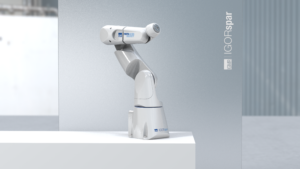
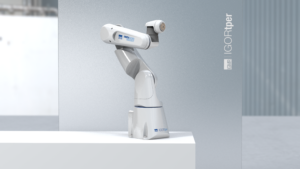
The next generation of our robot is designed. The new robot is called IGOR Tper. This robot has a non-spherical wrist, that makes the motion planning for the robot rather challenging.
Contact:
Markus Schmitz
The IGMR visits the Automatica in Munich
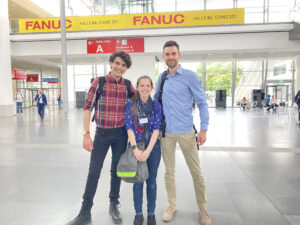
After a long, involuntary break, IGMR was able to visit Automatica in Munich for the first time again. Together Jan Wiartalla, Amir Shahidi and Sophie Charlotte Keunecke explored various innovations and presentations and had many interesting conversations. In addition, some final year students of RWTH and IGMR presented their extremely interesting projects at Automatica and offered an exclusive view even beyond the exhibited possibilities.
On the last day of the fair, June 24. 2022, Sophie Charlotte Keunecke represented IGMR at a panel discussion on “Automation and robotics: what drives the new generation?” at the Automatica Forum. You can find the video here on the Youtube channel of Automatica.
Contacts:
Sophie Charlotte Keunecke
Jan Wiartalla
Haptic Feedback System RePlaLink
The videos are also available on our Youtube channel:
Humans interact with hand-actuated products on a daily basis. Examples are car doors, manual presses, furniture doors, machine housings, fitness equipment, or reconfigurable types of furniture. The RePlaLink can be used for the simulation and haptic representation of such mechanisms based on virtual prototypes. This makes it possible to improve the development process of such systems and reduce the use of physical prototypes.
The RePlaLink consists of a servo-driven kinematic structure with a handle as haptic interface. Due to its structure, it is particularly well suited to simulate planar mechanisms. The system measures, among others, the user forces, takes them into account in a real-time simulation of the virtual mechanism and displays its reaction. This allows users to directly feel the mechanism’s haptic properties while operating the system. Users can change them interactively by modifying the mechanism’s parameters and get direct haptic feedback. This enables fast, inexpensive, and frequent validation and evaluation of haptic properties, even at early development stages. The videos introduce the structure of the RePlaLink and show the haptic simulation and synthesis of an exemplary hand-actuated mechanism.
You can find more information about the project here.
Contact person:
Jan-Lukas Archut
Mahshid Pour Ebrahimabadi
Results of the project Next Generation
Der an dieser Stelle eingebundene Inhalt führt Sie auf Seiten, die von der von Google betriebenen Seite YouTube - YouTube, LLC, 901 Cherry Ave., San Bruno, CA 94066, USA - zur Verfügung gestellt werden. Mit dem Aufruf des Inhalts kann YouTube Ihre IP-Adresse und die Sprache des Systems, sowie verschiedene browserspezifische Angaben ermitteln. Wenn Sie in Ihrem YouTube-Account eingeloggt sind, ermöglichen Sie YouTube, Ihr Surfverhalten direkt Ihrem persönlichen Profil zuzuordnen. Dies können Sie verhindern, indem Sie sich aus Ihrem YouTube-Account ausloggen. YouTube verwendet Cookies und Tracking-Tools. Die Datenverarbeitungsvorgänge sowie die Zwecke der Verarbeitung können direkt bei YouTube erfragt und eingesehen werden.
At the end of the Next Generation project, the perspectives of all those involved were collected. As always, the focus is on people. With the inclusive workplace and the collaborative robot, the project shows new perspectives for the employment of people with multiple disabilities. HRC is an enabler for inclusion in the primary labor market! We are happy about the great project results and the video reflecting them.
For more information about the project, click here.
Contacts:
Carlo Weidemann
Elodie Hüsing
Mathias Hüsing
Participation at European Robotics Forum (ERF) Hackathon 2022
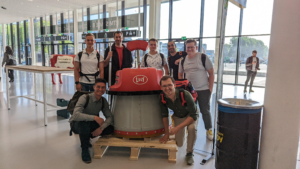
As part of the European Robotics Forum (ERF) Hackathon 2022, six IGMR students demonstrated their talent in prototyping and working with robots. The hackathon challenge was set by Lely, among others. Their ‘Juno‘ mobile robots are autonomous cylindrical platforms whose main task is to move the fencing around cows on farms to make the feed pushed into the space accessible again. The hackathon task was similar: two Juno robots had to move along the walls of two interconnected rooms at a given distance. Additional restrictions and challenges were added for extra points. The team was successful at the hackathon in Rotterdam. After a neck-and-neck race, the first place went to TU Delft. At the award ceremony, we were praised as the most cooperative team for our “constant support of other teams in design and 3D printing“. This ‘exemplary behaviour‘ is much appreciated and we look forward to taking part again next year.
Special praise goes to our students Sebastian Polzin, Frederik van Kerkom, Jonas Braun, Oleksander Kutovyi, Ali Berger and Yannik Freischlad for their efforts. We congratulate TU Delft on their well-deserved victory and are happy to have won many new friends and valuable contacts. We thank the institute management for the opportunity to participate and look forward to next year.
Contact:
Next Generation project wins 3rd Digital Prize
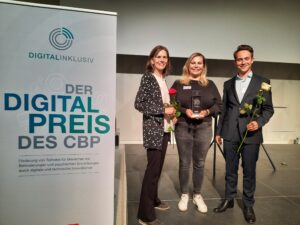
Together with our project partners Caritas Wertarbeit Köln e.V. and the Fachhochschule des Mittelstands (University of Applied Sciences for Small and Medium Enterprises), we accepted the third place in the Digital Prize and the prize money of 2,000 euros for the Next Generation project at the Futurium in Berlin on Tuesday, 3 May.
The Digital Prize is being awarded for the second time since 2019. According to the theme ‘Digital Inclusive’, the CBP aims to promote the use of digital technologies for people with disabilities and mental illnesses in the fields of disability assistance, psychiatry, politics, research, and business. At the end of the project, we are delighted to have received this award and would like to thank all those involved in and supporting the project. Next Generation is funded by the Stiftung Wohlfahrtspflege NRW, the Landschaftsverband Rheinland and the Caritasverband der Stadt Köln e.V.
Der an dieser Stelle eingebundene Inhalt führt Sie auf Seiten, die von der von Google betriebenen Seite YouTube - YouTube, LLC, 901 Cherry Ave., San Bruno, CA 94066, USA - zur Verfügung gestellt werden. Mit dem Aufruf des Inhalts kann YouTube Ihre IP-Adresse und die Sprache des Systems, sowie verschiedene browserspezifische Angaben ermitteln. Wenn Sie in Ihrem YouTube-Account eingeloggt sind, ermöglichen Sie YouTube, Ihr Surfverhalten direkt Ihrem persönlichen Profil zuzuordnen. Dies können Sie verhindern, indem Sie sich aus Ihrem YouTube-Account ausloggen. YouTube verwendet Cookies und Tracking-Tools. Die Datenverarbeitungsvorgänge sowie die Zwecke der Verarbeitung können direkt bei YouTube erfragt und eingesehen werden.
Contacts:
Mathias Hüsing
Carlo Weidemann
Elodie Hüsing



